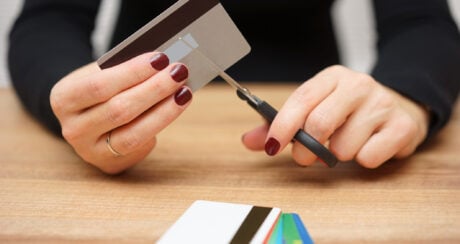Anyone with a credit card for a short time will have noticed an unusual transaction on their statement. Sometimes, there’s an obvious explanation for these, and other times, they will lead to the cardholder disputing the payment.
What does ‘disputing a transaction’ mean?
‘Disputing a transaction’ is the process of questioning or challenging a transaction made on a credit or debit card or through a bank account. When you dispute a credit card transaction, you essentially tell your card provider, ‘I’m not paying for that’.
A dispute can arise after you notice an unusual transaction on your credit card statement. That transaction could be a payment you didn’t authorise, goods you paid for and didn’t receive, or services you’re dissatisfied with, among other reasons.
If you cannot resolve the issue alone or with the merchant, the unwanted credit card charge will escalate to a dispute. That can ultimately result in a chargeback, which means you’ll get your money back.
What you can dispute
There are several potential reasons for a dispute, including:
- The card wasn’t valid at the time of the transaction
- You never received the goods and services you purchased
- You don’t recognise the transaction
- A periodical payment was cancelled, but the vendor continues to debit your account
- You already paid for the goods and services, and they’ve charged you again
- You were promised a credit that was not honoured
- The goods and services purchased were not defective or not as described
- You were charged the wrong amount for the product
- You returned a product and were promised a refund, but it never arrived
- The transaction amount wasn’t authorised
- The goods or services were delivered outside of an agreed-upon timeframe.
- Your credit card was stolen, and the transaction made on the account was fraudulent.
What you shouldn’t dispute
Before you dispute a transaction, you could try a few things first.
- Ask friends or family members who may have access to your card. That ‘unauthorised purchase’ might’ve been due to a friend or family member who used your card without your permission. See if you can resolve the problem with them first. A good rule of thumb: If you wouldn’t file a police report, you shouldn’t file a dispute.
- Check the business name. Most of us will have seen transactions from merchants we don’t recognise. So, Google search to see if the trading name differs from the one on your statement. Or, search the Australian Business Number (ABN) if it’s a local business that’s charged your card.
- Contact the merchant. Take a few minutes and reach out to the merchant responsible for the issue. Allow them to resolve the transaction first. If you cannot come to an amicable resolution, you can lodge a dispute with your card provider.
Remember: Transaction disputes and chargebacks are a simple solution but aren’t inconsequential. Disputing a transaction when you shouldn’t can trigger unintended consequences for merchants like small businesses, such as losing funds. So, ensure you have a solid reason before taking the next step.
How to dispute a credit card transaction
You can raise a dispute online, through mobile banking, over the phone, or in person at a branch. Your bank should then confirm the dispute and will try to recover your funds.
All credit card providers have dispute policies, with dedicated website pages and answers to frequently asked questions that at least attempt to make the process as painless as possible. The approaches vary, but banks almost always want to see that you at least tried to resolve the matter with the merchant first.
You’ll also need proof that you didn’t get what you paid for or hadn’t authorised the payment. Examples of evidence could include a dated message requesting the cancellation of a recurring payment or images and receipts showing that the goods or services you paid for weren’t what you wanted.
When your card provider passes your information regarding the transaction on to the card network — Visa, Mastercard or American Express — for the chargeback, those documents will be critical.
If a merchant continues to dispute your request, you may be required to provide further written documentation. However, the final decision will rest with the card network, each with its terms and conditions for resolving disputes.
🤓 Nerdy Tip
If you are concerned that a transaction may be due to fraudulent activity, place a block or lock on your card immediately. That will ‘freeze’ your card and prevent further transactions until the issue is resolved.
How long does it take to resolve a dispute?
As with chargebacks, a cardholder generally has up to 120 days to raise a dispute with their card provider from the purchase or transaction date. That can be extended to 540 days if, for example, you can show that the merchant has been difficult to contact or has been ignoring your requests for a refund.
You should check the terms and conditions for disputes on your operator’s website and keep all your supporting documents, such as printouts of web pages and email correspondence with the merchant, to support your claim.
If you take too long to raise a dispute, your card operator might reject it outright. So, make sure you check your statements every month for anything that could raise a red flag.
Once you’ve raised a dispute, a resolution will depend on your card operator and the network your card belongs to. For example:
- The Bank of Queensland takes up to 45 days to resolve an EFTPOS or ATM dispute with a merchant and up to 75 days for Visa Debit disputes.
- The National Australia Bank endeavours to resolve all disputes within 45 days.
- Suncorp attempts to resolve direct debit disputes, which are generally easier to resolve, within seven days, EFTPOS and ATM disputes within 30 days and Visa Debit disputes within 45 days, though that will depend on the nature of the transaction, the bank says on its website.
Frequently asked questions about disputing credit card transactions
You can also dispute a pending transaction where the money spent has not left your account, but the purchase cost has already been deducted from the available funds. Card providers generally recommend waiting before lodging a dispute over a pending payment because they can’t commence an investigation until the transaction is processed.
If the dispute concerns recurring payments, such as a website subscription or a gym membership, you should cancel that service immediately to avoid further charges to your card. If a particular merchant continues to take money from your account, even if you ask them to stop, ask your provider to place a block on that business.
DIVE EVEN DEEPER

Lost Credit Card? Here’s What to Do
If you lost your credit card, don’t panic. Lock your card, then contact your issuer and take steps to limit the damage of fraud.

Guide To Making Credit Card Payments
When you make a credit card payment, you’re repaying what you owe. You can pay off the entire balance or make a partial or minimum payment.

How To Cancel A Credit Card The Right Way
Before you cancel a credit card, know your reason, check transactions, pay off your balance, and redeem your rewards.

How To Read Your Credit Card Statement
Regularly checking your credit card statement is an important way to empower yourself financially and stay on top of your debts.

